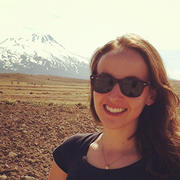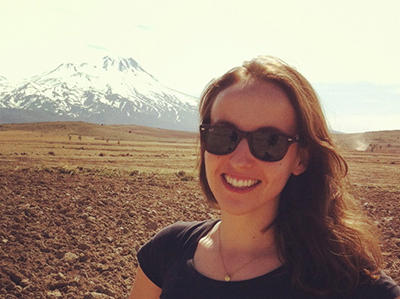
Chloe Safier works for Oxfam International where she is the Gender Justice Coordinator. She graduated with an AM in Middle Eastern Studies in 2010.
 What brought you to CMES and to an AM in Middle Eastern Studies?
What brought you to CMES and to an AM in Middle Eastern Studies?
While I was an undergraduate at Wesleyan University, I received a grant to conduct research for my thesis on the myth of gender equality in the Israeli military. That research, which included interviews with former women soldiers who had experienced sexualized violence and harassment, sparked my interest in gender, conflict, and militarism in the Middle East, and specifically how war and occupations in the region have impacted women’s lives. I came to CMES at Harvard in the hopes of studying this issue with an interdisciplinary lens, through coursework and research in law, policy, history, anthropology, and government.
How did your academic interest develop while you were at Harvard?
I was surprised to find how much I enjoyed taking courses at the law school. In classes on gender-based violence, transitional justice, and international humanitarian law, among others, I found that legal instruments and the ways they are—or aren’t—implemented provides a fascinating lens through which to understand power and inequality, particularly when applied to the context of the Middle East and towards the promotion of women’s rights. I became very engaged in one research paper in particular, on the legal accountability of coalition forces for increased rates of gender based violence in Iraq under occupation. I remember thinking then that I wanted to find a way to make a career out of working on these issues.
How did you make the transition from Harvard into “the real world”? Tell us about some of your first experiences.
During my time at Harvard, I interned at the Carr Center for Human Rights Policy at the Kennedy School, where I was able to meet people working on human rights and international development. It was a great experience, and my time there gave me a chance to imagine what various types of careers in those fields might look like. I went on to intern for the Governance, Peace and Security team at the former UNIFEM (UN Development Fund for Women), and I was fortunate to be there when UN Women, a new gender entity within the UN, was created in 2010. I began working at UN Women as a consultant after I graduated from the Master’s program. It was an exciting time to be working there, with a great deal of momentum on the global stage towards promoting women’s rights and gender equality.
Tell us about your current job. How has your CMES background prepared you for working in an international non-profit organization?
I currently work as Oxfam International’s Gender Justice Coordinator. The work has been both challenging and inspiring, especially when I have a chance to meet and learn from the work that women (and men) are undertaking—sometimes at the risk of their lives—in the global fight for women’s rights and gender justice. The courses I took at CMES, particularly those that focused on law and gender based violence, have helped me to understand the academic debates and technical approaches to these issues, and allowed me to develop my skills in writing, research, and analysis. The intensive time I spent studying Arabic has been useful, too, in visits to the region. I’m grateful to still be learning every day from the diverse community of people I work with and meet through my job—inspiring international development and humanitarian professionals, women’s rights activists, and human rights defenders.
—Interview conducted by Salmaan Mirza (CMES AM '13)
